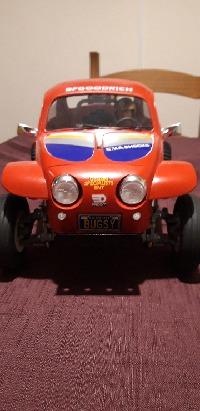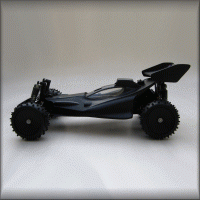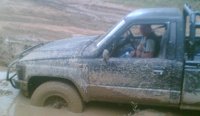|
|
|
TOPIC:
Re: Speed Controller Help 11 years 10 months ago #10147
|
It's noticeably slower, but I wouldn't say it's "very slow" by any means ... maybe about 20% slower? I have a Bowler Wildcat shell on a Frog/Brat chassis, even with the "low speed" gearing set up, I had to change to a 45T motor because it was too fast - a scaler that does donuts isn't really right I think with the gearing in a Brat set to "high speed" with the relevant spur gear & pinion, its top speed would be about the same as many other cars with a 27T silvercan I'm just saying that ESC does have some uses - if you don't want it, don't bin in - stick it on ebay, I'm sure someone would pay a tenner for it |
|
Please Log in to join the conversation. |
Re: Speed Controller Help 11 years 10 months ago #10148
|
Ok thanks think ill stick it on ebay tonight my neighbour passed the build manual and the controller box to me earlier that he found in his house today and it has all the information i needed on the back
|
|
Please Log in to join the conversation. |
Re: Speed Controller Help 11 years 10 months ago #10149
|
Mmm... "Tourer" sounds like a strange description for a crawler ESC.
Meant for the road at least... although definitely for off road. Not sure myself how fast the HPI is exactly but normally a 35T would be slower than a silvercan. Then again, it'll have more torque and work well in heavy conditions. Did they mention anything about the brake behaviour? Posted simultaneously with the two previous messages... |
|
|
Please Log in to join the conversation.
Last edit: by Edou.
|
Re: Speed Controller Help 11 years 10 months ago #10150
|
Yeah instructions state peak brake 50 amps? if that means anything to you?
|
|
Please Log in to join the conversation. |
Re: Speed Controller Help 11 years 10 months ago #10154
|
A 35 turn motor won't spin as fast as a 27, but there'll be bags more torque, meaning it should be fairly sharp in a standing start. Like Jonny said, a 35 turn would be best in something that needs to be slow but powerful, eg a lorry, scaler, crawler etc. It would also be suited to a car that's geared too high, eg a nitro to electric conversion or bunging wheels on that are too big.
Another benefit of more windings is that to get them all into the same space inside the motor, the wire has to be thinner, which in turn means the amount of current it draws will be less & the run time will be longer (Perhaps "Tourer" is akin to "Endurance" or "Long distance"). It could also work well using your buggy in a confined space - there'd be lots of acceleration/wheelspin, & you wouldn't have the worry of going too fast to stop before hitting the garden fence! ie, ideal for ramps & kerbs zoomin around close to you, pants for tearing across a carpark racing your mates. The 50 amps braking current is the maximum current the ESC will allow into it when the motor is behaving as a generator - braking works by shorting out the motor leads. If the car is freewheeling, the motor is behaving like a generator, so braking is the same as shorting the output from said generator. The 50 amps is the degree of shorting the ESC will allow, ie the amount of maximum braking effect (Similar to shorting the motor through a resistor, rather than just crossing the leads to stop it)
Custom F2
...
Hilux crossmember drawing
...
F2 axle drawing
...
Quattro radio lid
...
Holiday Buggy motor bracket drawing
...
Quattro resto
...
HitnMiss engine
...
Wild Willy resto
...
Mardave Cobra resto
...
Thunder Dragon resto
...
Grasshopper resto
...
XR311 resto
...
Modded XR311
...
Carbon 25th scratch build
|
|
|
Please Log in to join the conversation. |
Re: Speed Controller Help 11 years 10 months ago #10209
|
ok didnt need this speed controller so thought what the badword strapped it in to my thundershot running a 540 silver can and took it off roading this afternoon and properly hammered it off road while keeping an eye on the controller and it ran brilliantly didnt even get warm? so now im confused??
|
|
Please Log in to join the conversation. |
Re: Speed Controller Help 11 years 10 months ago #10211
|
I'd say that's cos the "Turns rating" of an ESC is only a rough guide, it's the actual amps that a particular motor is drawing that's important. It may also be that that ESC has overload protection & is actually limiting the current to the silver motor to whatever a 35 turn would draw as a maximum, but it's so little different, you don't notice.
Now, someone correct me if I'm wrong, but I seem to remember reading somewhere that some of the modern Tamiya silver cans are wound more than 27 turns(?) - perhaps yours is one of these? By the way, an ESC that gets hot isn't necessarily a sign of it being overloaded - some cheapy ones use low grade FETs which have a higher internal resistance, which hence makes them get hot when there's a lot of energy flowing through them. This is why people "Stack" them in parallel, to effectively halve the resistance, so less power is wasted as heat. It's also a good way of increasing the power handling (Lower turns rating) of the ESC
Custom F2
...
Hilux crossmember drawing
...
F2 axle drawing
...
Quattro radio lid
...
Holiday Buggy motor bracket drawing
...
Quattro resto
...
HitnMiss engine
...
Wild Willy resto
...
Mardave Cobra resto
...
Thunder Dragon resto
...
Grasshopper resto
...
XR311 resto
...
Modded XR311
...
Carbon 25th scratch build
|
|
|
Please Log in to join the conversation. |
Re: Speed Controller Help 11 years 10 months ago #10214
|
Indeed the number of turns is nothing more than an indication and the max allowable current is the main thing.
I have a 17+ turns Robbe ESC that I'm sure I can melt with my 17T LRP Challenge motor. On the other hand, I think my 13+ turns LRP ESC could handle the 10T Orion motor that is not highly tuned. Not that I'm gonna try though... |
|
|
Please Log in to join the conversation. |
Re: Speed Controller Help 11 years 10 months ago #10216
|
Pinion size & surface make a great deal of difference to the load on the motor, and therefore the Amps pulled - I know the stock pinion size is 15T, I'm not sure what the other options are but I'm sure it has options for both smaller & larger pinions - less teeth on the pinions on gravel or dirt means less amps, more teeth & long grass means way more draw...
For instance, I've managed to "thermal" a TEU101BK ESC by getting the gearing wrong on a silvercan motor If the magnets are worn out (well, have lost some of their magnetism, for instance by getting overheated at some point) that would have an effect too. Another possibility is that your ESC has better than spec FETs - maybe someone used the wrong ones, the supplier gave them the wrong ones, they'd run out of the right ones, higher spec ones were cheaper that week, etc, etc. If it works, count it as a bonus & don't look too close I'm not aware of any "silvercan" motors with more than 27 turns, but I suppose it's possible... I'm pretty sure the "lightly tuned" Tamiya motor is a 28T. I am aware that some have fewer though - I can't remember where it came from, but I have a 25T silvercan & it is noticeably faster. TBH I can't even remember what car I put it in |
|
Please Log in to join the conversation. |
Re: Speed Controller Help 11 years 10 months ago #10219
|
Yes yes, gearing, wheel size, friction etc etc all affect the amount of current the motor will draw, as will the condition of the motor, but I think the turns rating is more related to the maximum the motor can draw, ie locked-rotor current (The windings behaving purely as a resistor, whose value depends on length of wire & wire diameter) - this is what is usually specified on industrial motors & inverter drives, but I'm guessing "Number of turns" is something much easier for the hobbyist to go by. Idea is that when idiot monkey boy drives his toy car into a wall & stalls his 27 turn motor, the 27+ turn ESC doesn't fry & leave it's manufacturer with a Trade Descriptions claim.
Comes back to component quality - PROPER MOSFETs have a negative temperature coefficient, meaning when they draw too much current & get warm, their internal structure actually reduces the amount of current the device will allow to flow, so theory says if your ESC has proper MOSFETs in it & not cheapskate bipolar transistors, overloading won't be a problem, they'll just get warm & slow the car down. Cheap bipolar devices work the other way, in that the more current that flows, the hotter they get, & the hotter they get, the more current they'll let through, & so on until they self-destruct (Called thermal runaway, & is the cause of most 1970s audio amplifier output stage failures). I've also seen ESCs with "overload Protection" circuitry, which drops the current to a safe level before the FETs see it. Symptoms of this working are a warm/hot ESC & the car stuttering as if it had a low battery, whereas MOSFETs protecting themselves just appears as gradual slowing of the car. MOSFET destruction (In any piece of equipment) usually occurs from high voltage spikes, static or being connected with reverse polarity, otherwise they're pretty bomb-proof
Custom F2
...
Hilux crossmember drawing
...
F2 axle drawing
...
Quattro radio lid
...
Holiday Buggy motor bracket drawing
...
Quattro resto
...
HitnMiss engine
...
Wild Willy resto
...
Mardave Cobra resto
...
Thunder Dragon resto
...
Grasshopper resto
...
XR311 resto
...
Modded XR311
...
Carbon 25th scratch build
|
|
|
Please Log in to join the conversation. |
|
|
|
Time to create page: 0.176 seconds




